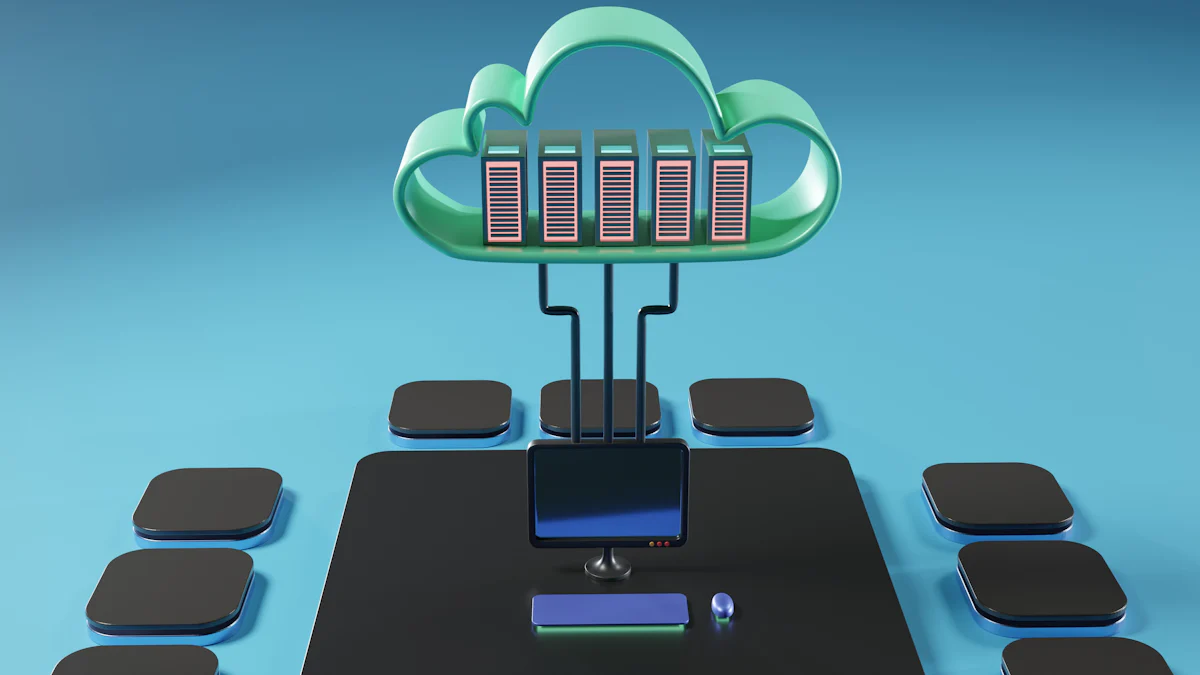How to Switch to a Cloud-Based Career with Microsoft Azure

Cloud computing is reshaping the job market, offering exciting opportunities for those ready to embrace change. The demand for cloud professionals is skyrocketing, with a predicted 15% growth in employment opportunities from 2021 to 2031. This surge highlights the importance of cloud skills in today's economy. Microsoft Azure stands out as a leading cloud service provider, offering robust tools and services that empower businesses and individuals alike. Transitioning to a Cloud-Based Career with Azure not only opens doors to lucrative salaries but also positions you at the forefront of technological innovation.
Understanding Cloud Computing

What is Cloud Computing?
Cloud computing is transforming how businesses operate. It allows you to access computing resources over the internet, eliminating the need for physical hardware. This approach offers flexibility and scalability, making it a game-changer in the tech world.
Definition and Key Concepts
At its core, cloud computing involves delivering services like storage, databases, and networking through the internet. You can think of it as renting space and power from a remote server instead of owning your own. This setup provides you with the ability to scale resources up or down based on your needs.
Types of Cloud Services (IaaS, PaaS, SaaS)
Cloud services come in different flavors:
Infrastructure as a Service (IaaS): Offers virtualized computing resources over the internet. You manage the software, while the provider handles the hardware.
Platform as a Service (PaaS): Provides a platform allowing you to develop, run, and manage applications without dealing with infrastructure complexities.
Software as a Service (SaaS): Delivers software applications over the internet, on a subscription basis. You access these applications via a web browser.
Why Choose a Cloud-Based Career?
The shift to cloud computing opens up a world of opportunities. A Cloud-Based Career positions you at the forefront of innovation, offering exciting prospects and growth.
Industry Demand and Job Opportunities
The demand for cloud professionals is booming. Companies across industries are adopting cloud solutions, creating a surge in job opportunities. By pursuing a Cloud-Based Career, you tap into a field with a predicted 15% growth in employment opportunities from 2021 to 2031.
Advantages Over Traditional IT Roles
Cloud-based roles offer unique advantages over traditional IT jobs. You focus more on creating and implementing business solutions rather than technical configurations. The inherent scalability of cloud computing means you don't have to worry about precise server and storage requirements. This shift allows you to engage in more strategic and innovative tasks.
A Cloud-Based Career not only provides you with stability but also places you in a rapidly evolving field. You gain the chance to work with cutting-edge technology and drive business transformation.
Introduction to Microsoft Azure

Overview of Microsoft Azure
Microsoft Azure is a powerhouse in the cloud computing world. It offers a wide array of services that cater to businesses of all sizes. You can use Azure to move applications and workloads to the cloud seamlessly. Some popular services include virtual machines, storage, and databases. Azure also provides tools for developing and deploying AI and machine learning applications. This versatility makes it a go-to choice for many enterprises.
Key Features and Services
Azure stands out with its comprehensive features. It offers both Infrastructure as a Service (IaaS) and Platform as a Service (PaaS) components. You can store data in Microsoft data centers located globally, ensuring reliability and scalability. Azure's commitment to open-source software allows you to develop applications effectively from anywhere. This flexibility is crucial for anyone looking to build a Cloud-Based Career.
Comparison with Other Cloud Providers
When you compare Azure with other cloud providers, its integration capabilities shine. Azure is the only hybrid cloud service on the market, making it ideal for businesses that need hybrid deployment. It integrates easily with existing Microsoft solutions, which many companies already use. This compatibility gives Azure an edge over competitors, especially for those transitioning to a Cloud-Based Career.
Benefits of Using Azure for Career Transition
Switching to a Cloud-Based Career with Azure offers numerous advantages. You gain access to a platform that is constantly updated with new features and services. This ensures that you stay at the forefront of technological advancements.
Integration with Existing Microsoft Products
Azure's seamless integration with Microsoft products is a significant benefit. If you're familiar with Microsoft tools, transitioning to Azure becomes much easier. This compatibility allows you to leverage existing skills and knowledge, making your career shift smoother.
Comprehensive Learning Resources
Azure provides a wealth of learning resources to support your career transition. You can access online courses, tutorials, and community forums. These resources help you build the necessary skills for a Cloud-Based Career. Additionally, Microsoft offers cloud certification programs, such as the Azure Fundamentals certification. These certifications enhance your resume and increase your earning potential.
By choosing Azure, you position yourself in a dynamic and evolving field. The platform's robust features and resources make it an excellent choice for anyone looking to embark on a Cloud-Based Career.
Skills Required for a Cloud-Based Career
Embarking on a Cloud-Based Career with Microsoft Azure requires a blend of technical and soft skills. Let's dive into what you'll need to succeed.
Technical Skills
Understanding of Networking and Virtualization
In a Cloud-Based Career, grasping networking and virtualization is crucial. You need to understand how data moves across networks and how virtualization allows multiple systems to run on a single physical machine. This knowledge helps you manage and optimize cloud resources effectively.
Proficiency in Programming and Scripting
Programming and scripting skills are vital. Languages like Python, Java, or C# enable you to automate tasks and develop cloud applications. Scripting helps you manage cloud environments efficiently, making your role more dynamic and impactful.
Soft Skills
Problem-Solving and Analytical Thinking
A Cloud-Based Career demands strong problem-solving abilities. You'll face challenges that require innovative solutions. Analytical thinking helps you assess situations and devise strategies to overcome obstacles, ensuring smooth cloud operations.
Communication and Teamwork
Communication and teamwork are key in a Cloud-Based Career. You'll collaborate with diverse teams to implement cloud solutions. Clear communication ensures everyone is on the same page, while teamwork fosters a productive and harmonious work environment.
By honing these skills, you position yourself for success in a Cloud-Based Career. The combination of technical expertise and soft skills will make you a valuable asset in the ever-evolving cloud industry.
Certifications and Training
Embarking on a Cloud-Based Career with Microsoft Azure requires the right certifications and training. These credentials not only enhance your resume but also boost your earning potential. Let's explore the certifications and resources that can set you on the path to success.
Microsoft Azure Certifications
Microsoft offers a range of certifications tailored to different roles and expertise levels. These certifications validate your skills and knowledge, making you a valuable asset in the cloud computing job market.
Azure Fundamentals
The Azure Fundamentals certification is an excellent starting point for anyone new to cloud computing. It covers basic cloud concepts, core Azure services, and security and privacy in Azure. This certification helps you build a solid foundation, preparing you for more advanced certifications.
Azure Administrator Associate
Once you've mastered the basics, the Azure Administrator Associate certification takes your skills to the next level. This certification focuses on managing Azure resources, implementing storage solutions, and configuring virtual networks. It demonstrates your ability to manage Azure environments effectively, making you a strong candidate for cloud-based roles.
Expert Testimony: Jorge Rodrigues, a cloud computing expert, emphasizes the importance of certifications like the Microsoft Certified: Azure Solutions Architect. He notes that these credentials enhance your expertise and appeal to potential employers.
Training Resources
To succeed in a Cloud-Based Career, continuous learning is crucial. Microsoft provides a wealth of resources to help you prepare for certifications and stay updated with the latest cloud technologies.
Online Courses and Tutorials
Online courses and tutorials offer flexible learning options. Platforms like Microsoft Learn and Coursera provide comprehensive courses on Azure services and solutions. These resources allow you to learn at your own pace, ensuring you grasp complex concepts thoroughly.
Community Forums and Study Groups
Engaging with community forums and study groups can significantly enhance your learning experience. Platforms like Stack Overflow and Microsoft Tech Community connect you with other learners and professionals. You can ask questions, share insights, and collaborate on projects, enriching your understanding of Azure.
Expert Testimony: James World, a Microsoft Azure Solutions Architect Expert, highlights the value of staying at the forefront of the industry. He achieved his certification by leveraging online resources and engaging with the cloud community.
By pursuing these certifications and utilizing available training resources, you position yourself for a successful Cloud-Based Career. The combination of recognized credentials and practical knowledge will make you a sought-after professional in the ever-evolving cloud landscape.
Building Experience and Portfolio
Embarking on a cloud-based career with Microsoft Azure requires more than just certifications. You need practical experience and a strong portfolio to stand out. Let's explore how you can build both effectively.
Gaining Practical Experience
Practical experience is crucial in the cloud computing field. It helps you apply theoretical knowledge to real-world scenarios, making you a more competent professional.
Internships and Entry-Level Positions
Start by seeking internships or entry-level positions. These roles provide hands-on experience and expose you to the day-to-day operations of cloud environments. Many companies offer internships that focus on cloud technologies, allowing you to learn from experienced professionals. This experience not only enhances your skills but also boosts your resume, making you more attractive to potential employers.
Personal Projects and Contributions to Open-Source
Personal projects are another excellent way to gain experience. Create your own cloud-based applications or solutions using Azure. This practice allows you to experiment and learn at your own pace. Additionally, contributing to open-source projects can be incredibly rewarding. It gives you the chance to collaborate with other developers and gain insights into different approaches and solutions. Plus, it demonstrates your initiative and passion for cloud computing to potential employers.
Creating a Professional Portfolio
A well-crafted portfolio showcases your skills and projects, setting you apart from other candidates. It serves as a tangible demonstration of your capabilities and achievements.
Showcasing Skills and Projects
Include detailed descriptions of your projects in your portfolio. Highlight the skills you used and the challenges you overcame. Use visuals like screenshots or diagrams to make your projects more engaging. This approach helps potential employers understand your expertise and problem-solving abilities.
Utilizing Platforms like GitHub and LinkedIn
Platforms like GitHub and LinkedIn are invaluable for building your professional presence. GitHub allows you to share your code and collaborate with others, while LinkedIn helps you connect with industry professionals. Keep your profiles updated with your latest projects and achievements. Engage with the community by participating in discussions and sharing insights. This networking can open doors to new opportunities and help you stay informed about industry trends.
Pro Tip: James World, a Microsoft Azure Solutions Architect Expert, emphasizes the importance of showcasing your work on platforms like GitHub. He notes that a strong online presence can significantly enhance your career prospects.
By gaining practical experience and creating a compelling portfolio, you position yourself as a strong candidate in the cloud computing job market. These steps not only demonstrate your skills but also reflect your commitment to continuous learning and growth in this dynamic field.
Job Search and Application Process
Preparing Your Resume and Cover Letter
Crafting a standout resume and cover letter is crucial when applying for cloud-based roles. You want to make sure your application grabs attention and showcases your skills effectively.
Highlighting Relevant Skills and Experiences
Focus on the skills and experiences that align with cloud computing. Highlight your technical expertise, such as proficiency in Azure, programming languages, and networking. Include any certifications you've earned, like Azure Fundamentals or Azure Administrator Associate. These credentials demonstrate your commitment and knowledge.
Tailoring Applications to Specific Roles
Customize your resume and cover letter for each job application. Research the company and the specific role you're applying for. Use keywords from the job description to align your application with what the employer seeks. This tailored approach shows that you understand the role and are genuinely interested.
Interview Preparation
Preparing for interviews can be nerve-wracking, but with the right strategy, you can shine.
Common Interview Questions for Cloud Roles
Expect questions about your technical skills and experience with cloud platforms. You might be asked to explain cloud concepts or describe how you've implemented solutions using Azure. Practice answering these questions clearly and confidently.
Pro Tip: Research common interview questions for cloud roles. Practice your responses to ensure you articulate your thoughts effectively.
Demonstrating Problem-Solving Abilities
Employers value problem-solving skills. Be ready to discuss scenarios where you solved complex issues or improved processes. Use real-world examples to illustrate your ability to think critically and adapt to challenges.
Insight: Networking and participating in online forums can provide valuable insights into what employers look for. Engaging with professionals in the field helps you stay informed and prepared.
By focusing on these areas, you enhance your chances of landing a cloud-based role. Tailor your applications, prepare thoroughly for interviews, and showcase your skills confidently. You're on your way to a successful career in cloud computing!
Continuous Learning and Career Growth
Staying Updated with Industry Trends
In the fast-paced world of cloud computing, staying informed is crucial. You need to keep up with the latest developments to remain competitive.
Following Tech Blogs and News
Tech blogs and news sites are excellent resources. They provide insights into emerging technologies and industry shifts. Regularly reading these can help you understand trends and innovations in cloud computing. This knowledge keeps you ahead of the curve.
Attending Webinars and Conferences
Webinars and conferences offer valuable learning opportunities. They connect you with experts and peers in the field. By attending, you gain firsthand knowledge of new tools and practices. Plus, these events often feature discussions on future trends, helping you anticipate changes in the industry.
Advancing Your Career
To grow in your cloud-based career, you must focus on continuous improvement and skill enhancement.
Pursuing Advanced Certifications
Advanced certifications can significantly boost your career. They validate your expertise and open doors to higher-level positions. Consider pursuing certifications like the Azure Solutions Architect Expert. These credentials demonstrate your commitment to mastering complex cloud environments.
Exploring Leadership Roles
Leadership roles offer a path to career advancement. As you gain experience, look for opportunities to lead projects or teams. Developing leadership skills not only enhances your career prospects but also allows you to influence strategic decisions within your organization.
By embracing continuous learning and seeking growth opportunities, you position yourself for long-term success in the cloud computing industry. Stay curious, keep learning, and watch your career flourish.
Switching to a cloud-based career with Microsoft Azure offers you a world of opportunities. You gain access to cutting-edge technologies and the chance to work with industry experts. The financial and professional rewards are significant. To start, take the first step by exploring Azure's resources and certifications. Remember, continuous learning and adaptation are key. Stay curious, keep updating your skills, and embrace the exciting journey ahead. With dedication, you'll thrive in this dynamic field and unlock new possibilities for your career.
See Also
Crafting Your Path to Success as an Azure Developer
Steps to Achieve Success as a Dynamics 365 Consultant
Navigating the Path of a Power Platform Developer Career
